#clapper the seal
Text

PART 2!! Donkey Kong Country 2 animal buddies, Sonic-ified!
#ThattsCherrysArt#art#digital art#sonic the hedgehog#sth#sonic#donkey kong country#dkc#animal buddies#animal friends#mobian#Rattly#Rattly the Rattlesnake#Squitter#Squitter the Spider#Glimmer#Glimmer the Anglerfish#Clapper#Clapper the Seal
59 notes
·
View notes
Text
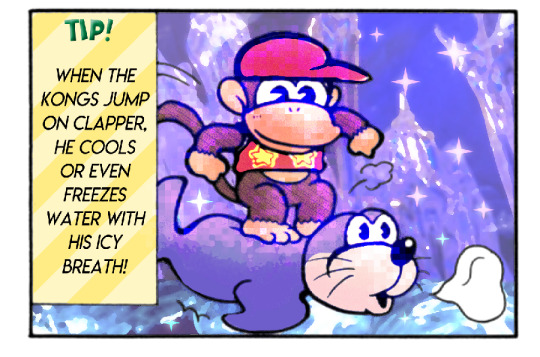


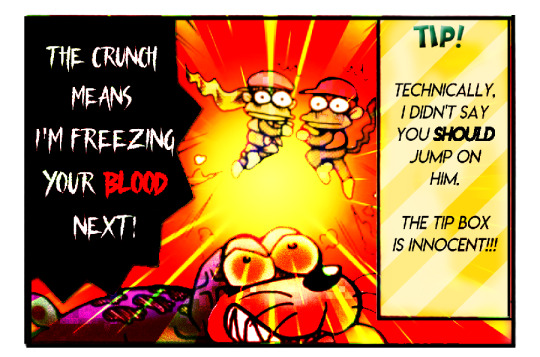
And that's how the very first Snowmad came to be.
#DixieKongFacts

#dixie kong#donkey kong#diddy kong#dixie#clapper the seal#snowmads#dkctf#dkc2#snes#wii u#switch#nintendo#dkc animal buddies#dkc manga#dixiekongfacts
41 notes
·
View notes
Text
Urianger had Liios's help in developing his water-walking spell, although Liios had expressly told him at the time that he didn't think it was going to work on liquid surfaces.
Liios came from a hunter-gatherer clan in the tundra, so they had a traditional spell that would let them traverse snowy terrains very quickly without sinking in, and being able to cross frozen lakes with a much lower risk of cracking the ice/falling in.
How did Liios know it wasn't going to work on water? He tried already.
Dumbass who said "watch this" then nearly drowned in a chest-deep pond where his dad was teaching him how to walk over ice.
#liios suvali#and then urianger did it!!! liios was loudest clapper on that pier#like a seal i tell you
1 note
·
View note
Text
Family Porn Night: A Movie Review
As the opening titles come on screen, we hear but don’t see the sound of water sloshing in a bucket, being wrung out of a rag, heavy breathing, scrubbing. The titles fade and we see a woman, on her hands and knees, cleaning the floor of what we eventually learn is the British Museum. We hear footsteps, the sharp bark of a man saying, “Move!” as he and several others, carrying a fossil on a stretcher, tramp across the floor she has just cleaned. On the fossil we see a handwritten tag that reads “Sea Lizard found by Miss Mary Anning Lyme Regis.” The man in charge harrumphs, pulls the tag off, and replaces it with a tag that says “ICHTHYOSAURUS LYME REGIS Presented by H. Hoste Henley Esquire.” He has written Mary Anning out of history.
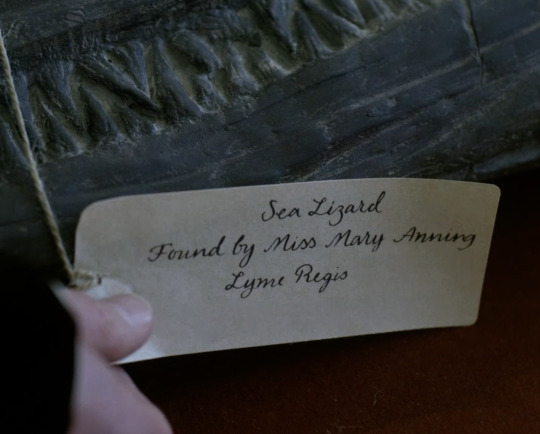

Ammonite is writer/director Francis Lee’s attempt to write Mary Anning, and queerness, back into the world of 1840s Britain. The plot is a simple romantic drama with an enigmatic ending. Simply put, Mary Anning falls in love with Charlotte Murchison but chooses to remain alone rather than give up her career by moving with Charlotte to London. The complex beauty of the movie comes from Lee’s subversion of audience expectations as well as some traditional film-making procedures. But how well he succeeded is still up for debate. The movie flopped at the box office, grossing under $1,000,000 world wide, failing to recoup the $3,000,000 distribution rights, let alone the $13.4 million in production costs. Carson Timar of “Clapper” wrote, “This is a bland and empty feature that feels like an ancient fossil void of any passion or substantial emotion” (Timar, 2020). With movie darling Kate Winslet in the lead and rising-star Saoirse Ronan playing opposite her, the lackluster reception is surprising. Does Ammonite, like Moonlight, prove that queer films need to be sexless to be successful (Lodge, 2017), or can we ascribe Ammonite’s box office bomb to other causes? I believe the erotic scenes are only part of the answer. While I disagree with the Rotten Tomatoes reviewer who said, “Simply out [sic], Ammonite commits that cardinal sin of being truly boring” (Andrew L., Ammonite, 2022), the slow pace likely contributed to Ammonite’s poor, reception sealing Ammonite’s fate as a “perfectly respectable, eminently professional slice of prestige arthouse” (Clarke, 2021) doomed to accrue financial losses. The other variable is not lesbian eroticism per se but rather lesbian eroticism scripted by women for the female gaze. In other words, two of the components that Lee uses to queer cinema are the very things that make it a failure in the public sphere.
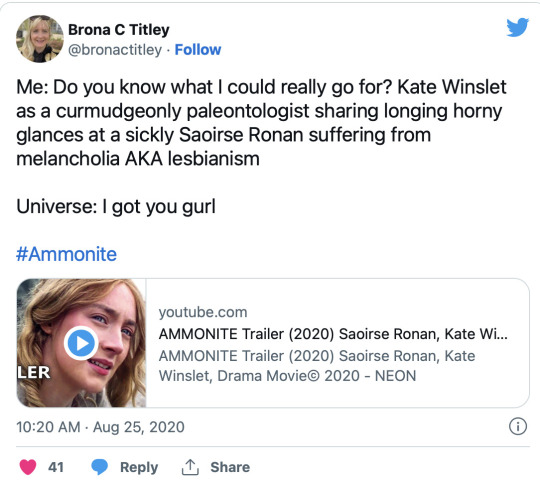
In Ways of Seeing (1972), John Berger writes, “Seeing comes before words…It is seeing which establishes our place in the surrounding world” (p. 7). Lee builds Mary Anning’s rocky world slowly, introducing the audience to her visually before any words are spoken. Although this is the well-trodden territory of a period romance, this is a romance that reimagines history. Mary Anning was a real person from Lyme Regis, UK, who sold fossils (called ‘relics’ in the movie) to the British Museum beginning at age 11. But there is no evidence of her having a love interest, gay or otherwise. Some of Anning’s descendants have questioned Lee’s manipulation of her story, which highlights the problems with “outing,” or ascribing queerness to public figures. Posthumously attributing identities to people may be a tempting way to queer the past by showing “the world that many widely admired and respected men and women are gay” (Duggan, 2006, p. 153), but it can be problematic to apply a modern understanding of queerness to people who cannot confirm or deny those identities and who may or may not have accepted our definitions. In other words, even if Anning had engaged in romantic liaisons with other women, she may not have seen those relationships as queer, either in the sense of their being gay or out of the ordinary. Lee attempts to “honor the complexity of [Anning’s] differences” (Duggan, 1991, p. 155) by building a rich and textured world that includes multiple ways of forming relationships. Even while I acknowledge that “outing” Anning may be problematic, I still find joy in the sapphic world Lee imagines.
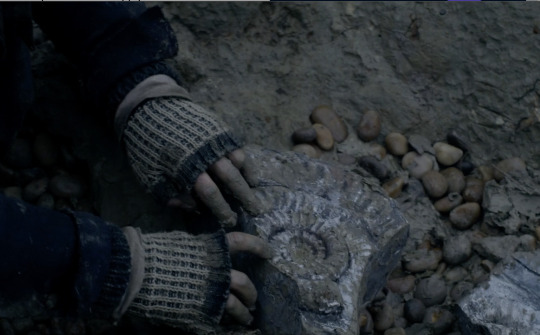
Lee’s femme-centered world doesn’t limit gender expression. Mary is a complex character, outwardly mirroring the coldness of her Lyme Regis beach but with a depth of feeling we catch in glimpses, most often through Winslet’s uncanny ability to convey emotion without speaking. Mary plays with gender performance, but retains her essential womanness, subverting early Hollywood’s “gender-inversion stereotype” (Bernshoff & Griffin, 2004, p. 7). She smokes and swears frequently, has dirty fingernails and armpit hair (appropriate for the time but not for Hollywood). When engaged to take care of Charlotte, who has “melancholia,” Mary says, “There looks to be fuck all wrong with you to me” (0:28:30). She genuinely loves finding and cleaning fossils. When Charlotte, who has recently lost a baby, asks Mary if she has children, Mary replies, “I have my work. I don’t need children as well” (00:51:38).

As the movie progresses, Lee reveals Mary’s tender (feminine) side, showing her caring for a sick Charlotte and, at one point, wearing a dress and perfume to attend a recital with Charlotte. After Charlotte returns to London, Mary receives a letter from her. Before opening it, Mary lifts it to her nose hoping to catch the perfume Charlotte wore.
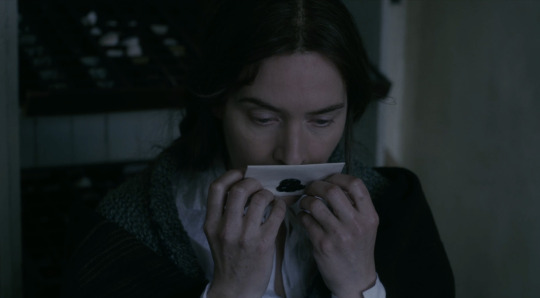
Charlotte originally acts as a more traditionally feminine counterpoint to Mary’s masculinity. She wears bonnets and bows, black to show mourning, and delicate heeled shoes. She’s weak and pale from what her husband calls “melancholia” but which could more honestly be called depression, either from the loss of a baby or the pressure of passing as heterosexual. Her angst doesn’t last long. Within a few scenes, Charlotte sets aside her expensive clothing for rugged boots to better accompany Mary on her morning fossil huts. Color comes back into her cheeks, she laughs more frequently, and she fully engages in Mary's work. Charlotte’s awakening coincides with her temporary move from London to Lyme Regis while Mary simply is regardless of her location. This juxtaposition has been noted by Karl Schoonover and Rosalind Galt in Queer Cinema in the World (2016), “Some people have to travel to express their sexuality and/or gender, and others stay home” (p. 77).
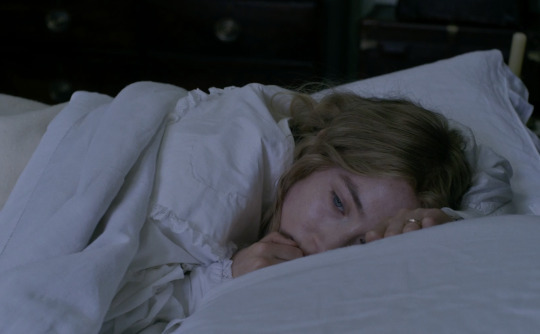

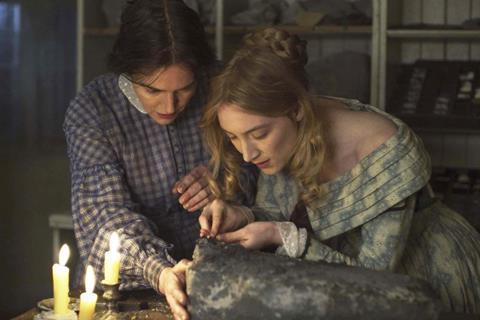
Lee contrasts elements in order to show how the women grow closer while retaining their core identity. While lying in bed together, Charlotte says, “Say it again.” Mary then recites a limerick:
There was a young woman named Sally
Who loved the occasional dally.
She sat on the lap
Of a well-endowed chap
And she said, ‘Oh, you’re right up my alley” (1:15:45).
Charlotte smiles, having let go of some of her feminine-coded sensibilities, while Mary, nude and vulnerable, curls trustingly next to her.
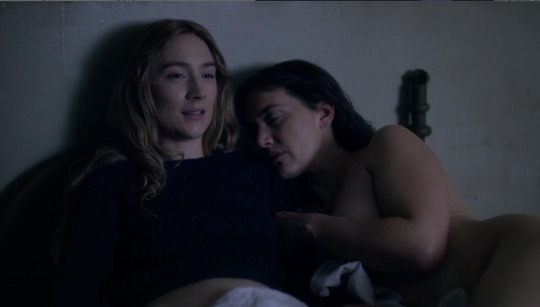
In a similar contrasting scene, Mary wades into the white-cap waves, turns, and waits for Charlotte to join her. Charlotte slowly walks out, frightened. She reaches Mary, who grabs her around the waist and smiles. Charlotte clings to her, still afraid, but feeling safe in Mary’s arms. This scene is the only time we see Mary laugh, and her joy mirrors the bright sun and warm filter unusual in this movie. Here, Mary both protects and pushes Charlotte, never demanding Charlotte change but offering help if Charlotte chooses to take it.
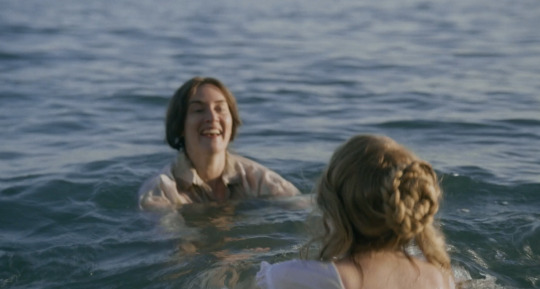

Two intimate scenes in the movie show just how transformative Lee’s film-making is. Rather than hire an intimacy choreographer, Lee, Winslet, and Ronan scripted each sex scene by themselves, relying on open communication and the trust they had in each other. These aren’t the “throw her up against the wall with no foreplay” scenes so common in heterosexual sex scenes, nor are they the “soapy shower and giggling college girls” lesbian scenes meant for the male gaze. Instead, Ammonite’s “staging of sexuality, gendered embodiment, and nonheteronormative sex” (Schoonover & Galt, 2016, p. 11) successfully disrupt heteronormative ideas about how sex happens, who enjoys sex, and how they enjoy it.

“Don’t take no for an answer,” seems to be the mantra in many erotic heterosexual scenes, but the first erotic scene in Ammonite queers cinema by pausing the action mid-point. After Charlotte kisses her, Mary kneels in front of Charlotte. Before going further, she waits, staring up at Charlotte until Charlotte raises her own skirts in enthusiastic consent.
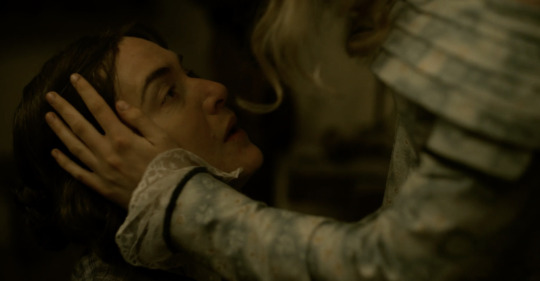
The final erotic scene queers cinema by subverting audience expectations. The night before Charlotte is to return to London, they lovingly caress each other’s faces. Noses touching, they gently kiss. As the scene progresses, they each guide the other’s hand, sometimes moving the hand to their own pudendum and sometimes away. Lee uses close camera angles, focusing on how the women’s bodies move together. The camera stays on each woman’s face as she climaxes. These are women showing each other how they want to be touched. Each woman confidently directs the actions of the other while asserting her own right to pleasure.
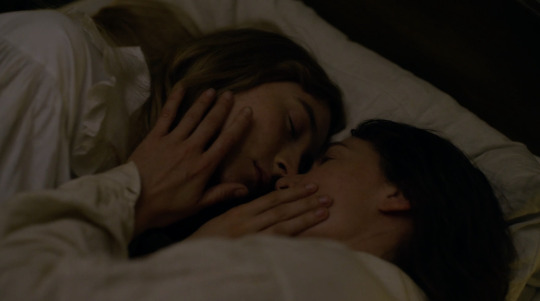
Both erotic scenes are enigmas in the movie industry: female pleasure for a female gaze. Per Schoonover & Galt, cinema is “an apparatus of desire, endlessly reconstituting what Jacqueline Rose called sexuality in the field of vision” (2016, p. 11). Eroticism scripted by women, focusing on how women experience pleasure, queers film in a uniquely feminist way; it uses “the potential of the erotic to remake the cinematic desire machine” (Schoonover & Galt, 2016, p. 11) reflecting the sapphic world Lee has created. I argue that the initial sex scene with a focus on enthusiastic consent and cunnilingus is a “counterpublic logic of visibility” that queers media by “extending representation beyond mainstream fantasies about white femme lesbians” which is “achieved in and through sex acts” (Schoonover & Galt, 2016, p. 12). Both erotic scenes, as well as other hinted-at but not seen moments, occur in Mary's home or on Mary's beach, "locating lesbian desire in a domestic setting and turning to familial intimacies as a place where women might find fulfillment beyond the strictures of marriage" (Schoonover & Galt, 2016, p. 19). Once the women are in London, in Charlotte's male-owned home, the intimacy (physical and emotional) falters and dies.
Gender expansiveness and eager consent are not the only way Lee queers cinema. We learn that Mary had a relationship with another woman in her town, Elizabeth Philpot (played by Fiona Shaw), which ended when Mary’s father died. Elizabeth acts as an oracle, guiding Mary in her relationship with Charlotte and foreshadowing the end of that same relationship. When Mary’s mother, Molly (played by Gemma Jones), dies, Elizabeth visits Mary and says, speaking of their past romance, “I wasn’t sure I could live up to you. Or your expectations of me…You seemed to do everything you could to be distant…It seems your Mrs. Murchison has been able to unlock something in you I couldn’t…” (1:34:16). Here, Elizabeth references the softness Lee showed in the limerick and beach scenes. It’s also vital to note that neither woman seems to have faced ridicule because of their relationship, nor do they seem to have kept it particularly quiet. I appreciate seeing a lesbian relationship that doesn’t double as a morality play.

Mary follows Elizabeth’s advice and accepts an invitation to visit Charlotte in London. From this point on, Lee relies more heavily on language and sound to convey how small and out-of-place Mary is. This sudden cinematic shift undermines the queer worlding I found so lovely in the first two-thirds of the movie.
At London port, bodies (all of them male except hers) are in constant motion. They press around her while they yell to and at each other. We’ve lost the cool tones of Lyme and found harsh sunlight. Lee’s feminism is not subtle. If "(queer) film theory is always a feminist project" (Schoonover & Galt, 2016, p. 11), Lee hits the brief, but he does so with a sledgehammer.

At Charlotte’s house, Mary opens a curio cabinet containing fossils she helped Roderick Murchison (played by James McArdle) find. The tag on one of the fossils reads, “Cornu Ammonis. Dorset Coast. Miss Mary Anning.” Taking it out, Mary notices the last line has been pasted on top of the original line. Pulling it back, Mary reads, “Mr. Murchison Esq.” Lee doesn’t just allude to his correction of the historical record, he screams it.
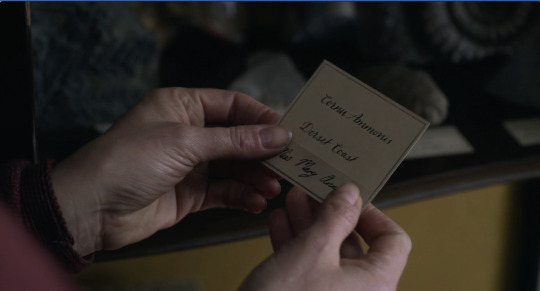
The breakup scene between the two women is similarly heavy-handed. Charlotte shows Mary to a room she has decorated for her “so we can be together always.” Winslet does an excellent job conveying a parade of emotions, but the ensuing dialogue lacks finesse and undermines the acting prowess of both Winslet and Ronan.

Mary doesn’t directly answer Charlotte, instead saying, “I really shouldn’t…I wanted to see my relic in the British Museum today….”
When Charlotte expresses dismay and repeats her offer to provide Mary with a new home, Mary says, “You presumed I’d just be fitted into your life here, like one of my relics in your fine glass case…Will you label me, too?” (1:47:45). Charlotte insists, “I want this to be different. Our different…I don’t want to go back to the life I had before you” (1:48:07). The unnatural, forced dialogue breaks Lee's “show, don’t tell” rule and makes it hard to access the emotion Lee wants us to feel.
Mary rushes out of the house, and we next see her in front of her ‘relic’ at the British Museum. She notices the tag, the first time she’s seen it, and, looking up, sees Charlotte gazing at her across the glass-encased fossil. The camera pans out in one of the few long-shots of the film and we see the women, faces covered by bonnets, caged fossil in the middle. Men in top hats circulate around them.
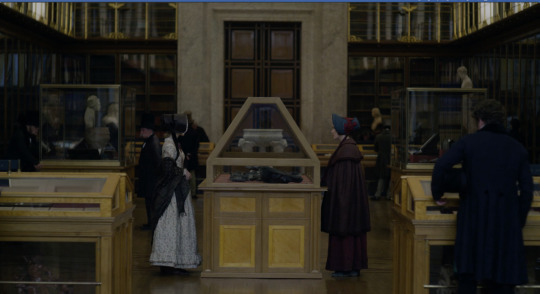
As if afraid that he wasn’t clear enough, in the last scene Lee reminds the viewer of his intentions. Mary walks through a portrait gallery showing the men who helped create and run the British Museum. The very last image is Mary, facing back toward the gallery, framed.
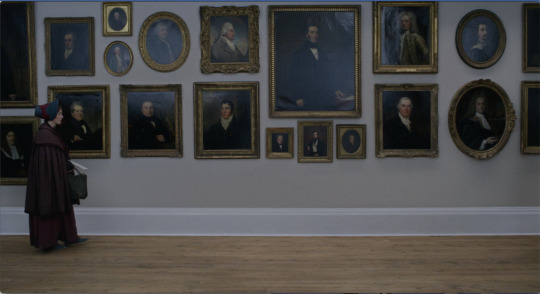

It isn’t just the shift to London or the sudden heavy-handed cinematography that jars the viewer. The final 20 minutes of the film tackles class issues but ignores broader themes of imperialism and racism.
Classism is seen best in Mary’s interactions with Charlotte’s housekeeper. When the housekeeper answers Mary’s knock, she assumes from Mary’s rough clothing that she’s a hired worker. The housekeeper says, “Tradesman’s entrance is around the side. Go all the way back” (1:41:29). After explaining who she is, Mary is shown to the drawing room and Charlotte greets her with a passionate kiss. Mary glances at the housekeeper, but Charlotte says, “Oh, that’s just the maid,”(1:44:23) at which point the housekeeper side-eyes the women and shuts the drawing room door. Class bias goes unchallenged by any of the characters even in light of Charlotte’s relationship with poor, rural, crass Mary. Additionally, there are no Black, Indian, or Egyptian people. At the height of British imperialism, there should be several non-white people, especially once the action moves to London.
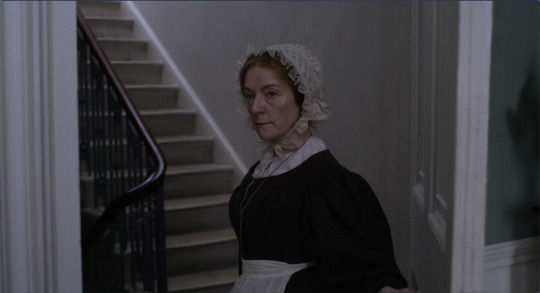
Ammonite does not employ “an anti-imperialist stance that de-privileges the Western queer film canon” (Schoonover & Galt, 2016, p. 15) in part because it fails to address Britain’s imperialism and in part because it, too, uses Western imperialist structures to (unsuccessfully) promote itself. Originally available only in theaters and on Amazon, viewers can now access it through other streaming services such as Hulu and Vudu. All subscription based. All part of the cinema industrial complex.
I enjoyed Ammonite. At least, I enjoyed it the second time. The first time, thinking it would be similar to the 2019 movie Wild Nights With Emily, I convinced my husband and my two daughters, aged 18 and 15, to watch it with me. As a heterosexual-passing pan woman who has been in love with Winslet since the 1995 remake of Sense and Sensibility, I had looked forward to seeing her in a role that more accurately represented me. However, sitting with two of my children I felt my face turn red. In a brilliant parenting moment /s I tried to cover up my embarrassment by saying, “This is important. People with vaginas experience sexual pleasure differently than the movies make it seem. As people with vaginas, we have to advocate for our own pleasure,” at which point my 15 year old ran out of the room, eyes closed, hands over her ears. The 18 year old stayed, but mostly to ridicule my parenting. Two years later, when my daughters feel particularly spicy, they’ll say, “Hey, mom! Remember when you made us watch lesbian porn?”
They echo criticism from the public. One reviewer said, “Serious concerns that a famous lady has been wronged by the Lesbian storyline. Proof/truth? As for the soft porn. Why? Nothing more than eroticism for a very small segment of the population” (Alastair G, Ammonite, 2022). Even though I disagree that the movie is soft porn, and I disagree that we're a "very small segment of the population," I think Alastair hits (unwittingly) on the reason the movie failed. A combination of the slow pace and sex by and for women, two of the aspects that queer the movie, result in an insurmountable barrier for a public that is trained to prefer action and rough-and-ready sex created for the male gaze.
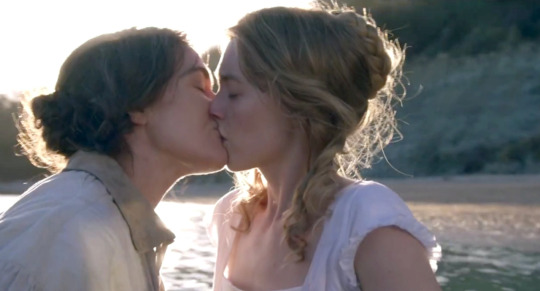
References
Benshoff, H., & Griffin, S. (2010). In Queer Cinema the film reader (pp. 1–15). essay, Routledge. Taylor & Francis Group.
Berger, J. BBC and Penguin. (1972). chapter 1. In Ways of seeing (pp. 7–34).
Canning, I., Sherman, E., O’Reilly F.C. (Producers), & Lee, F. (Director). (2020). The Ammonite [Motion picture]. United Kingdom: Lionsgate.
Clarke, D. (2021, March 26). Ammonite: Even the saoirse ronan-kate winslet sex scenes are too respectable. The Irish Times. Retrieved October 10, 2022, from https://www.irishtimes.com/culture/film/ammonite-even-the-saoirse-ronan-kate-winslet-sex-scenes-are-too-respectable-1.4517920
Duggan, L., & Hunter, N. D. (2006). Chapter 12: Making it perfectly queer. In Sex wars: Sexual dissent and political culture (pp. 149–163). essay, Routledge.
Lodge, G. (2017, January 5). Does Moonlight show gay cinema has to be sexless to succeed? The Guardian. Retrieved October 10, 2022, from https://www.theguardian.com/film/2017/jan/05/does-moonlight-prove-that-gay-cinema-has-to-be-sexless-to-succeed
Na. (n.d.). Ammonite. Rotten Tomatoes. Retrieved October 10, 2022, from https://www.rottentomatoes.com/m/ammonite
Schoonover, K., & Galt, R. (2016). Introduction Queer, World, Cinema. In Queer Cinema in the world (pp. 1–34). Duke University Press.
Schoonover, K., & Galt, R. (2016). Figures in the World: The Geopolitics of the Transcultural Queer. In Queer Cinema in the world (pp. 35-78).
Timar, C. (2020, December 6). Ammonite. CLAPPER. Retrieved October 10, 2022, from https://www.clapperltd.co.uk/home/ammonite
by Bryn Brody

#queermedia#Ammonite#AmmoniteMovie#Saoirse Ronan#Kate Winslet#Lesbian Film#Francis Lee#Movie Review#Mary Anning#Lyme Regis#romance movies
77 notes
·
View notes
Text
Mood Indigo
By William Matthews [x]
From the porch; from the hayrick where her prickled
brothers hid and chortled and slurped into their young pink
lungs the ash-blond dusty air that lay above the bales
like low clouds; and from the squeak and suck
of the well-pump and from the glove of rust it implied
on her hand; from the dress parade of clothes
in her mothproofed closet; from her tiny Philco
with its cracked speaker and Sunday litany
(Nick Carter, The Shadow, The Green Hornet, Sky King);
from the loosening bud of her body; from hunger,
as they say, and from reading; from the finger
she used to dial her own number; from the dark
loam of the harrowed fields and from the very sky;
it came from everywhere. Which is to say it was
always there, and that it came from nowhere.
It evaporated with the dew, and at dusk when dark
spread in the sky like water in a blotter, it spread, too,
but it came back and curdled with milk and stung
with nettles. It was in the bleat of the lamb, the way
a clapper is in a bell, and in the raucous, scratchy
gossip of the crows. It walked with her to school and lay
with her to sleep and at least she was well pleased.
If she were to sew, she would prick her finger with it.
If she were to bake, it would linger in the kitchen
like an odor snarled in the deepest folds of childhood.
It became her dead pet, her lost love, the baby sister
blue and dead at birth, the chill headwaters of the river
that purled and meandered and ran and ran until
it issued into her, as into a sea, and then she was its
and it was wholly hers. She kept to her room, as we
learned to say, but now and then she’d come down
and pass through the kitchen, and the screen door
would close behind her with no more sound than
an envelope being sealed, and she’d walk for hours
In the fields like a lithe blue rain, and end up
In the barn, and one of us would go and bring her in.
2 notes
·
View notes
Link
Check out this listing I just added to my Poshmark closet: New Sealed The Clapper Sound Activated On/Off Switch White Lights.
0 notes
Link
Check out this listing I just added to my Poshmark closet: (2) Vintage Fenton Violets In The Snow On Silver Milk Glass Bells Signed.
0 notes
Text
A Funeral for Fishes
Year: 2021
Class: Architectural Design 6
Instructor: Prof. Erika Lindsay
Focusing on the adaptive reuse of "Gamla Síldarverksmiðjan" (Old Herring Factory) in the city of Djúpavík, I wanted to continue exploring what it means to have lost such a vital part of the economy in the region and to have this massive reminder of that industry's death still standing on the beach. To this ended, I wanted to turn the factory into a self-reflective place. A place for mourning the lives of those who were damaged by the herring industry's collapse, the industry itself, and the fish the industry used up.

The machinery rooms would be sealed up and turned into a reliquary for the old equipment. The main factory floor would be opened up to the fjord and its skeletal structure extended out into the water. At the end would be a bell tower, with the bell's clapper attached to a buoy in the water below to allow control of the tolling to the waves. Beneath the main floor, the water of the fjord pools into vast reflective ponds. An assembly line on the highest most floor is carved away and replaced by empty mullions to suggest the old form, inaccessible to the living.
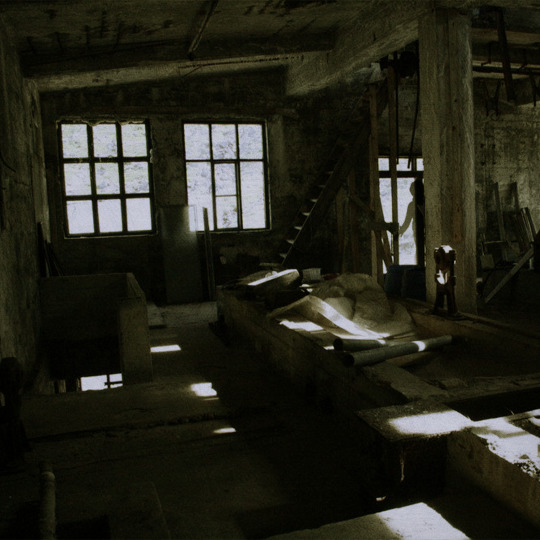




0 notes
Text
0 notes
Text
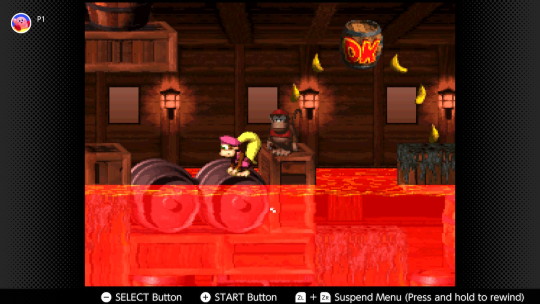

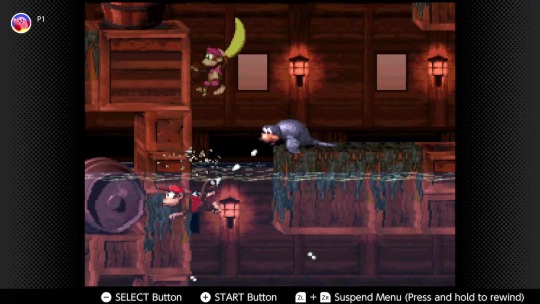
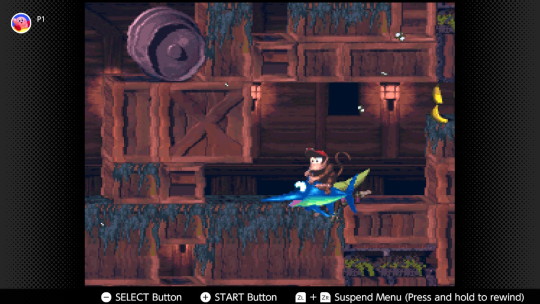





Crocodile Cauldron: Lava Lagoon
The water here inside the ship is red. That mean the water is to boiling to swim or touch. The only way to cool the water down is to keep bouncing on one of the animal friends. His name is "Clapper the Seals." But it will last only a little while so you have to hurry.
#cwgames#donkey kong country 2#nintendo#super nintendo#diddy kong#dixie kong#clapper the seal#seal#enguarde
1 note
·
View note
Photo
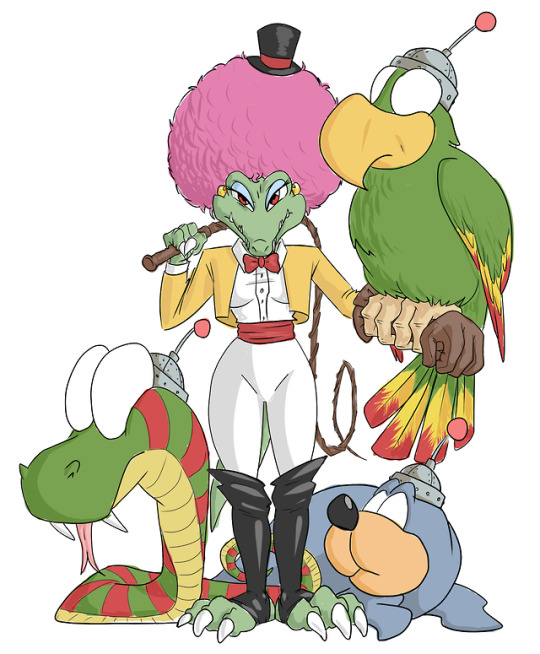
Kalypso's Kreatures
Kalypso the beast tamer from Kremling's Karnibal Kollection
https://sta.sh/2jydiiyyq08?edit=1
#kalypso#Kritter#kremling#kremling's karnival#kremling s karnival#clapper#squawks#rattly#parrot#viper#snake#seal#crocodile#alligator#Donkey Kong Country 2#Donkey Kong Barrel Blast#circus#carnival#beast tamer
16 notes
·
View notes
Photo
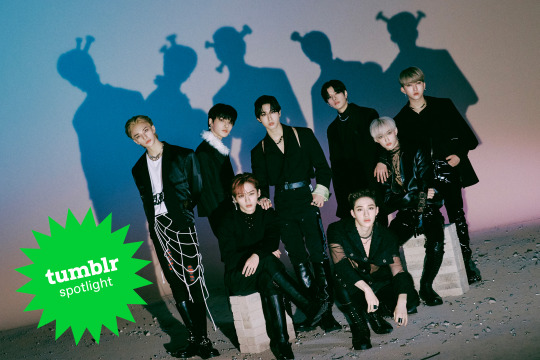
K-Pop Spotlight: Stray Kids
Masks off everyone—Stray Kids’ newest mini-album ODDINARY is finally out and it’s time to embrace the maniac within. To celebrate the new release and their upcoming fourth anniversary, we caught up with the group to talk about their new album and single, MANIAC, and the challenges and fulfillment that come with accepting your most authentic self. As a little bonus, we also asked the members to design their own Tumblr blogs (just in case you needed some inspiration). Check out our full interview below!
Tell us about your new mini-album ODDINARY in three words or less, but there’s a catch—you can’t use the words odd or ordinary.
Bang Chan: MANIACS ARE BACK!
Lee Know: Cool.
Changbin: Inner side, volcano, control.
Hyunjin: Super Power song.
HAN: Abnormal, freaky, potential are the three words that I think describe it best. We tried to describe the energy that explodes from our music in a different way this time, by slowly showing control over this energy.
Felix: Maniac, unique, and dark.
Seungmin: Interesting, fascinating, capturing hearts.
I.N: Mania, abnormal, conceptual.
Stray Kids’ music and concepts often encourage young people to be their most authentic selves regardless of other people’s opinions. How does ODDINARY fit into that narrative, and what do you hope your fans take away from it?
Bang Chan: This might not apply to everyone, but I feel like many people have experienced moments where they’re told to act normal (yep, I’ve been through that). We wanted to emphasize that “standards” don’t matter and that you have the authority to let out the “oddness” that’s been sealed inside you all this time.
Changbin: ODDINARY is a compound word that combines “ordinary” and “odd,” meaning that everyone has a normal and slightly weird side. Listeners will be able to experience the everlasting honesty and truthfulness that Stray Kids’ music has always displayed, with the more crazy side that Stray Kids have.
HAN: I hope that STAY and all listeners will be able to follow their hearts, rather than being confined by the judgment of others. I hope everyone also looks forward to the upgraded version of us.
Seungmin: Whatever situation may come, I hope that everyone is able to live in their most honest, unique way with versatility while never forgetting who they truly are. I hope our music can become a small strength.
Lightning round! You’re customizing your own Tumblr blog. Pick an aesthetic and a personal tag!
Bang Chan: Ooft... it’s hard to pick just one because my preferred aesthetics change depending on my mood. But if I had to pick one, it would be cyberpunk. The lights got me, and I’m a fanatic for futuristic stuff.
Lee Know: I want to decorate it using a clean, white tone.
Changbin: I want to use the tags #straykids, #stay, #stage, #music, which all mean a lot to Stray Kids.
Hyunjin: Vintage Tumblr, with #lovestay
HAN: I would like to decorate it like #black #chic to show a lot of calm yet cool atmosphere! I want to use the tags #black #chic #skz #loveyou #STAY.
Felix: #행복이 #felix 🐈⬛💛
Seungmin: #Seungtage. I really like vintage furniture and aesthetics, so I would like to decorate it using an organized brown tone.
I.N: I’m into vintage aesthetics these days, so I think I’ll go with vintage.
What was it like to meet your fans face-to-face at your SKZ’S CHOCOLATE FACTORY fanmeet after all this time? What was your favorite part?
Lee Know: I remember watching STAY clapping for us.
Hyunjin: I was so happy I could dance when I saw STAY from onstage for the first time in such a long time. Everyone was holding paper clappers. It was so cute.
Felix: Since it has been two years since we’ve had a fan meeting, seeing our STAY upfront was a very memorable and enjoyable day. We hope to see our fans again soon.
I.N: All fan meeting stages were fun, but the role-playing games we played with STAY were really fun!
What’s the meaning behind the album version titles “FRANKENSTEIN,” “MASK OFF,” and “SCANNING,” and why was it important for you to highlight them in this release?
Bang Chan: Based on the concept of the title song and the album, we thought it would be cool to use those keywords to make various versions. Based on the keywords, we can show different vibes of this album without breaking the overall vibe of the whole concept.
Changbin: We expressed the inner side that everyone has, the one that we are busy hiding.
Felix: These keywords express our emotions and lyrics about our odd sides in a world framed as ordinary. We express that it’s okay to have our own sides. We don’t have to hide when we take our masks off.
How would you say your relationships with each other have evolved over the years, especially after switching dorms and housemates?
Lee Know: I don’t feel as though a lot has changed, but I like that we have separate rooms now.
Hyunjin: I also don’t think a lot has changed because I go to the other dorms often.
HAN: After going through all the ups and downs during the past few years, we really have become inseparable. As we now have separate rooms, we’re able to have some personal time, allowing us to think more and be more relaxed by ourselves. I don’t think shared dorms affected our relationship too much because we still hit each other up whenever we’re bored and eat together.
As you approach your fourth anniversary as a group, are there moments you look back on as major instances of growth?
Seungmin: I think I was able to continuously break my personal challenges through the program Kingdom: Legendary War. While at the time I felt a lot of pressure, looking back on it, it was a precious experience that allowed me to grow.
I.N: I think we have become much more relaxed on stage, and everyone’s unique colors stand out more.
Want more of Stray Kids? Check out their new mini-album ODDINARY and the music video for “MANIAC” here.
3K notes
·
View notes
Text
Faith of Our Fathers
story for @inklings-challenge
Faith of Our Fathers
Teaser: The ruined ship was like a ghost on the horizon. Some days it showed stark and clear against the skyline while on others it drifted almost beyond sight. Today it towered above the group of pilgrims, slowly growing as they drew closer.
The ruined ship was like a ghost on the horizon. Some days it showed stark and clear against the skyline while on others it drifted almost beyond sight. Today it towered above the group of pilgrims, slowly growing as they drew closer.
Mr. Lyle Thomas could remember when their numbers were larger. He thought fondly of following his grandparents along a freshly worn trail to visit the SS Future Hope, one hand secure in his grandfather's large hand as they walked. There had been celebrations, and he'd felt important when his grandfather pressed the mushroom spore into his hand.
"Find a good place to plant it, and be thankful."
Now it was a mixed group of vehicles, leaving little trace in the waving grass. It was a quicker trip these days, to be sure, though he wouldn't say with authority that was why there was less interest and fewer pilgrims. His daughter Cait, accompanying him though she hadn't wanted to spend her day off on a trip into the wilderness, sat in the grav sled with him, the motor of their electric pony thrumming as it pulled them along, and complained about the music.
"Can't we listen to something newer?"
He patted the chunky radio with its heavy speakers. The old hymns sounded thin--not enough bass in the recording for the settings--and a poor substitute for voices raised together as they walked. But the words were still the same, and the tunes familiar. "Driver chooses the music."
"Can I drive?" she asked.
"Maybe on the way back," he allowed.
Cait huffed, dissatisfied. "You know they're saying at school that it's all wrong, that those on the Hope weren't heroes at all."
Mr. Thomas frowned, remembering watching his grandmother ease her way into the old engineering section, with its melted pipes and twisted walls. She'd slowly bent to tuck her mushroom into a forgotten corner--he'd been impatient by then, his own planted long ago on a clear section of panelling--and her voice wavered through a hymn of praise, thanking God for life and deliverance from evil.
"They weren't any better than anyone else, and it's foolish to say they were," parroted Cait. "We can read what really happened in the history books and the stories are just that."
"That's what they say, is it?" asked Mr. Thomas.
"Yes," said the girl. She shifted restlessly in her seat. "We have pictures, and memorials, back in New Haven. Why go all this way--and for what?"
The landscape changed, grasses thinning and dying as they entered the affected area around the ruined ship. Built to transport colonies between worlds, the SS Future Hope had fallen apart in the atmosphere. Her piloting crew fought the controls to bring her down with as little loss of life among the passengers as possible. The impact dug an enormous crater, throwing up waves of earth and carrying shreds and shards of the outer structure for miles. Stories said the survivors fell on their knees and thanked God for deliverance from a fiery death and persecution.
The bulk of the ship had cracked into two halves, enough remaining intact to create the illusion of a ship when one was far away. The shadow of the foredecks fell over the grav sled, and both passengers shivered. Sensors beeped, politely reminding them to engage safety gear. Mr. Thomas pulled on his mask, checking the bell clapper and seals and then looking at his daughter. She rolled her eyes. "I'm fine, Dad. See?" She wriggled the mask, showing it was seated properly on her face, and clipped the filter box to her belt. Gloves went on over their coveralls. Leaks in the Hope had either vented or seeped into the ground long ago, but the unhealthy look of the area encouraged caution.
"Good," said Mr. Thomas. He slowed the pony to a stop some distance from the public entrance. Others parked closer, but he didn't mind the walk. A group of pilgrims passed, coming from even further out, and he smiled as he heard them singing in unison, their voices filtered slightly through their masks.
"Great is the Lord and worthy of praise… By His power He proves He is love..."
"They're good," said Cait. "They must be a professional choir."
He nodded, pulling the box of mushroom spores out of a coverall pocket. "Do you want yours now, or later?"
She shrugged. "Later, I guess."
A large sign had been erected by the entrance, detailing the story of the colony founders gathering their brethren and embarking on the SS Future Hope to escape slavery or death should they not conform to their world's expectations. They'd come a great distance--passing the point of no return--when engine malfunction dropped them here. New Haven was founded on the survivors' beliefs, and as it grew and flourished they returned yearly to the wreckage--first to mourn the lost and later to remember why their families had risked everything on taking a colony ship to the unknown. They planted mushrooms and flowers, the mushrooms to restore the ruined earth, and the flowers to make it beautiful in due time.
The outer skin of the spaceship was gone, revealing struts. Early pilgrims had concentrated their efforts here, and now the entry to the Hope was a garden contrasting with the bleak surroundings and solemn aspect of the ruin. Clear paths marked the usual tours--the bridge, the passenger quarters, and one small but distinct way up to the highest point of the ruin.
"I didn't remember it being so big," said Cait.
It hit Mr. Thomas the same way each time. Space ships were not meant to be approached on foot, from this angle. It made you wonder how anyone would trust themselves to something so fragile. Catching the thought, he laughed at himself. He travelled regularly on business trips between planets, expecting a safe journey from each spaceship he boarded--and surely early colonists had done the same.
He followed his daughter as she picked the longest trail, scrambling up scaffolding and only glancing at the few plaques pointing out areas of interest. It was not an easy climb. Several walkways were narrow, the structural supports looking like wire. Cait moved with the agility of youth, while her father moved doggedly in her wake. He preferred to visit the passenger quarters, telling the story of the great-great grandparents and their family squeezed into a cabin with another family, trying to imagine bringing his own, smaller, family somewhere in the same space.
They paused on a viewing platform, gazing inside the hold. Light shafted down from above, giving dim illumination to the holographic projection showing the supplies the colonists had brought along. But behind that stretched empty space. Cait folded her arms on the rail, looking thoughtful, while Mr. Thomas caught his breath.
"Do you suppose those people at school have ever come here?" she asked.
"Maybe," said Mr. Thomas. "But you've seen how easy it is to forget what it's like."
She nodded. "And this isn't the same as experiencing what they went through."
"No. But this is something we have done, parents and children, since landing."
"But is it right to be thankful?" asked Cait. "Sure, it must have been scary, but are they the heroes we say they are? Were they really fleeing persecution?"
"It's hard to imagine now we have amicable relations with the worlds they left," agreed Mr. Thomas. "But does that excuse you from being thankful? Maybe… maybe we'll look back someday and say we were pleased by the wrong things. But I'd say it's worse to not be thankful at all, as if it's not a worthy exercise."
He stopped, not sure she was listening to him. Was it worth his time and effort to argue that the heart of the celebration was that God had taken their flawed efforts and mistakes and allowed them to build New Haven anyway?
They came out up-top to a cool breeze, refreshing after the long climb. Mr. Thomas drew in a long breath, glad to be out of the narrow corridors for a moment. The view was spectacular, with the sky clear all the way to where New Haven was laid out like a toy city on the plains below. A few other pilgrims moved about the platform, talking and laughing but paying no attention to the other visitors. Mushrooms sprouted in odd places, some so far out you wondered how they'd gotten there in the first place. A thin coat of moss had begun, showing the mushrooms had broken down enough to support growth.
"Shall we plant ours here?" asked Mr. Thomas.
"You usually put yours in the family cabin," said his daughter.
"You want to go there?"
"Maybe."
He thought again of his grandmother. "When I was your age, my grandma wanted to go somewhere out of the way. I wonder if we could find the spot."
"Where?" asked Cait, sparking with sudden interest, and he could only hope it lasted long enough to get them into the engineering section--which the impact had placed below ground-level.
From the highest heights to the lowest of lows, Mr. Thomas thought, and also, I don't remember when I last walked so much here. Resigned, but also eager, he checked his memory against the schematic map showing the easiest routes around the Hope and set off with Cait at his heels.
An elevator took them down through the cargo hold, the car feeling small in the empty space. On the floor, Mr. Thomas opened the door that would take them to the lower levels.
"When I was a boy," he began. "We came here every year." As they walked through a tight corridor he reminisced about the feeling of his grandfather's hand around his own, the readings and ceremonies, the way it sounded when the choir master stood and led the congregation in a hymn of praise. "They talked about how important it was to remember, and I wondered how anyone could forget. And then I thought that it was always the same every year, and how tired I was of hearing the same things."
"Seems like folk are tired of saying the same things," said Cait, referring to how little of the ceremonies remained. "Maybe they don't ring true anymore?"
"Maybe," said Mr. Thomas. "But I wish I could hear them again. And I wish you could have heard them. My stories don't do the experience justice."
It grew warm again as they descended, not that they'd been chilled by the open air. Mr. Thomas began to sweat under his face mask and he brushed his forearm against his forehead to try and quell the itch. Walls kept out the cooler outside air, and few people opened the connecting doors and airlocks when storms blew them shut again. They passed rooms where wires dangled, and sections of pipe had burst long ago. There were gaps where pieces had been scavenged for reuse. Consoles with melted screens testified to the original disaster. Father and daughter stepped carefully, feeling their way, suspecting that signs ought to have been posted to keep the place off-limits. Mr. Thomas pulled out a pen-light, its slender beam throwing the engineering section into stark relief and sending their shadows dancing over the walls.
"Dad?" asked Cait, breaking the silence. "What if I don't believe?"
Mr. Thomas felt his heart twist like the pieces of equipment that surrounded them. He didn't know if he had the right words. "I can't believe for you, honey--though I would if I could! But I can only pray I've shown you that it's worth the effort."
He risked a look over his shoulder, but his daughter was hidden in the shadows. She moved past him, ducking under a twisted cables of wires that had fallen out of the ceiling and then holding it aside for her father.
"I don't think anyone's been here since great-grandma."
"You just think that because no one's here now."
She made a face at him.
"Ah!" exclaimed Mr. Thomas as they entered the next room. "I remember this bit here. See how the red fused into an oak leaf shape?"
"If you say so, Dad." Cait made a show of examining the abstract design formed by the combination of elements. "I think it looks like a wrinkly hand."
He waved the criticism aside. "No, but it was right here, under this fallen slab."
They bent down. Mr. Thomas shone the pen-light into the nook, not expecting to see anything but dust. To his surprise there was a small colony of mushrooms feeding on the panel innards. Beneath their efforts, a tiny white flower blossomed.
"Great-grandma planted this?" asked Cait.
"I think she did," said Mr. Thomas. "Yes."
"But that was so long ago."
"Yes."
"And she never saw what happened!"
"I suppose not. I don't remember coming back here again with her."
"But I get to see it."
"Yes."
"Weird."
He smiled. "Yes. I suppose it is."
"Do you think they got lonely?"
"They're mushrooms," said Mr. Thomas. "They're just doing what they were designed to do."
"We should put ours here too," said Cait.
Together, they opened the box and pressed the fresh spores into place a little ways from the original spread, singing the simple hymn of remembrance.
"Because the Lord our God is good… His mercy is forever sure… His faithfulness at all times stood… and shall from age to age endure!"
"Is that what great-grandma did?"
"Yes," said Mr. Thomas. "Just like that." His daughter slid her gloved hand inside his, and he squeezed it gently. "Thank you for coming with me," he told her.
"I guess it wasn't so bad," said Cait. "...Can I drive on the way back?"
"We'll see," said Mr. Thomas, but he smiled.
#inklingschallenge#team lewis#genre: space travel#theme: stewardship#theme: grace#story: complete#Mel does the Inkling Challenge
18 notes
·
View notes
Text
Hetalia Characters as infomercials
China: LifeAlert—we all know why.
America: George Foreman Grill—what’s better than burgers?
Other options:
Oxiclean—he has the gusto
Magic Bullet—emphasis on bullet
Shake Weight/Nutrisystem—he’s unhealthy and wants to change but with minimal effort.
Prussia: Shamwow—it’s a meme, Gil loves memes. And who else can match that energy?
N. Italy: Chia Pet—cute and almost useless.
Belarus: One of those knife sharpeners—it’s very in her lane, and she has a use for it.
Germany: Flex Seal/Tape—he just wants to fix everything man, physical and emotional. He’s almost always the tape holding things together.
Romano: Total gym—he’s not buff, but he wants to be.
Russia: The clapper—he genuinely loves its concept and he’s innocent looking enough it endears people to buy it.
Spain: Scrub Daddy—it’s an effective tool and it has daddy in the name 😏
Canada: Snuggie—it’s cold up north, and it’s arguably one of the more practical on the list.
England: Magic Bullet—emphasis on magic.
Japan: Slap Chop—it can be handy, but it’s also a way to let out pent up aggression.
#hetalia imagines#hws hetalia#aph hetalia#aph america#aph china#aph prussia#aph italy#aph south italy#lovino vargas#aph russia#aph spain#aph canada#aph japan#aph england#listen#America could do almost any informercial#he has the energy#hetalia shitpost
46 notes
·
View notes
Text
The Pen and Sword - Part 3

Summary: Newly recruited to the Demon Slayer Corps, you finally meet your designated swordsmith. He may be as much of a misanthrope as others had warned, but you were nothing if not determined to bring him out of his shell.
Warnings: None
a/n: female reader, eventual smut, penpals with the feral misanthrope, both reader and Haganezuka are seventeen at the start of the story, established backstory for reader.
Part 1 || Part 2 || Part 3
Marketplaces were always your weakness.
The hypnotic, dizzying flux of city life was exhilarating, and you channeled that excitement into each step you took through the beautiful, colorful, noisy market of Osaka. Had it not been for the irascible young Pillar of Flame keeping you on track, you might have wandered off and lost yourself in kimono patterns and antique teacups. Your hands were itching for a needle and thread these days.
Rengoku’s grip on your sleeve was like a leash. It reminded you of your oldest brother, so stern and resolute. “Can you walk faster?” he grumbled, tugging you along. “You’re like a bird, getting distracted by shiny things.”
A retort was on the tip of your tongue, only … something shiny did catch your eye, a multitude of tinkling glass wind chimes dangling from wooden scaffolding and beckoning you closer with their paper ends, stretching out towards you like old friends as the wind rattled their clappers.
“Rengoku-san, will this market still be here after we find the demon?”
He looked at you as though you were a pesky child. “You win a few fights and you already think the world waits for you? We have another assignment after this.”
“Oh, that’s too bad,” you lightly said, and the corner of your mouth quirked upward. “I thought I saw a pretty comb that Ruka might really like. It had a fox painted on it.” You blinked up at him. “Did you know that’s her favorite animal?”
Rengoku eyed you for a moment before turning away with a guarded expression. “Is it now …” he trailed off.
You smiled in victory and looked behind you, catching a fleeting glimpse of the wind chimes as your sword rested comfortably at your hip.
———————❖———————
Haganezuka was at a loss.
A package rested inconspicuously on his table as he knelt before it, examining it from all directions until curiosity finally won him over and urged him to pluck off the accompanying letter attached to the wrapping.
He did not request a shipment of supplies recently, and the box was far too small to be a customer’s blade. And when he saw your name written on the sealed letter, with penmanship far more beautiful than he had ever seen before, Haganezuka was still baffled. You said you would write to him, not send him anything. Were these the remnants of your sword? Did you stuff the broken pieces into a small box like some ungrateful heathen? The mere thought of it made his pulse race, and before he could calm himself, he was tearing the wrapping to shreds.
A wind chime.
His clawed hands paused immediately upon seeing the fragile glass, and his ire diffused instantly as he carefully brought it out to hold in his hands.
The glass had the barest hint of green tint pressed into it. Very different from his collection. Even the flowers were different, some sort of outrageous white shape he had never seen before. Haganezuka dangled the wind chime by its string to hear its sound - light, high-pitched, and quick. Not quite like the lower melody of his bells, but it pleased him all the same. It was a new sound to admire and focus on, with just the right amount of bite to its song to grab his attention. He played with the bell for a minute, swaying it to and fro as he listened. The sound did not calm him so much as it invigorated him. Like it had something important to say and demanded his audience.
He hadn’t received a gift so thoughtful in a long time. Why did you send him this?
The letter.
Haganezuka-san, I hope you do not mind me sending you a package so suddenly. I came across a marketplace where a glass blower sold handcrafted wind chimes, and I thought of you instantly. The flowers are sagisō. They mean ‘my thoughts will follow you into your dreams’. It is my way of hoping my good wishes reach you. Please accept this gift as thanks for your beautiful blade. It has served me well so far - I have slain three demons with ease. Take care of yourself.
———————❖———————
A few days passed before you received a response. Not that you expected one to begin with, so it was a lovely surprise to come back to after a long day of training with Kuwajima.
I received your wind chime and hung it at the door of my forge. Clean your blade daily. Don’t be lazy. Safe travels.
You imagined him hesitating at the last sentence, pen hovering over the paper as he thought of an adequate send-off. It made you giggle fondly as you hid your smile behind the letter, innocently ignoring the questioning glance of your mentor.
———————❖———————
The lingering chill of spring gave way to an undeniably relaxing summer breeze, prompting Haganezuka to wander out of his forge in search of a local villager’s food cart. He did not have the patience to cook for himself. Why waste precious time when he still needed to harden the edge of his clay-encrusted sword?
And that is how the postman found him, stuffing his face with a bowl of yakisoba while he walked back to work.
He glared at the cowering man and grabbed the proffered letter. Let’s see what jackass needs another replacement , he groused to himself as he tore it open, balancing the yakisoba in the crook of his arm.
Familiar handwriting. How could he forget this penmanship befitting of an aristocrat? It could only be you.
Haganezuka-san, I felt inspired to write to you once more. It relates to a mission I recently completed. A demon lured me into the forest in hopes of blinding me with darkness. But I had the company of the full moon to light my path, and by fortuitous chance, I happened upon a grassy clearing that was illuminated by fireflies!
Haganezuka pinched the edges of the paper so tightly that the veins in his fingers threatened to burst. If this was leading to a jibe about his name, he would make you pay.
I wanted to close my eyes and listen for the demon, as I always do, but for the first time I felt inclined to rely on my sight. The fireflies really captivated me. The weight of my blade kept me focused on the task at hand, but I could not help the sudden strike of realization that occured to me as I watched the fireflies. And that thought is as follows: could it be that you were named Hotaru because the bright sparks flying out from striking a heated blade reminded your father of fireflies? The idea made me smile. I sat and watched the fireflies for a while. There is much to learn from their movements. Anyway, I drew the forest when I had some time after the battle.
He blinked and stared at the sketch. Simple yet structured. Every pen stroke held an important detail. It was not a masterpiece, but it was lovely all the same.
Heated sparks … like fireflies …
Perhaps his given name was not so embarrassing after all.
———————❖———————
Hello again! What I am about to say may seem silly, but I always dreamed of seeing the ocean, and that day has finally arrived! I cannot begin to explain the terrifying vastness of the water. Have you ever seen the ocean? Did it exhilarate and humble you like it did to me? I dared to walk barefoot along the coastline, even though it felt like I could be pulled in at any moment. The water was very cold and the salty air turned my hair into brittle kelp, but the sand felt so soft between my toes. I listened to the waves for a long time while I meditated with my sword in my lap. Ocean waves look very similar to the hamon on my blade. As per usual, I drew the landscape for you in case you have not seen the ocean.
Haganezuka treated himself to some dango as he read your letter. Later on, he would still taste the saltiness of the dango on his tongue as he folded burning steel. While he lost himself in thought during the methodical process, the wind chime at his door brought forth the memory of your light laughter. Did you laugh this freely as the water lapped at your feet? Did you taste the salty air on your tongue? Haganezuka somehow felt like he was there with you.
———————❖———————
I heard an interesting saying - the pen is mightier than the sword. Perhaps that might not resonate with you, but I wonder what you think about this phase.
———————❖———————
For the first time since the start of your one-sided correspondence, Haganezuka wrote you an actual, full-length letter. Or rather, he sent you pages upon pages of nothing other than his thoughts on how the pen was not, in fact, mightier than the sword, and that he nearly used your letter to wrap his steel wafers for smelting because it angered him so.
- dumbass would believe that bullshit. Did words allow the Edo bakufu to secure power? No, it was blood and steel. If I could meet the moron who thought of that saying, I would shove that pen right up his -
“What’s making you laugh so hard?”
You tittered as Ruka sat down beside you. “My swordsmith.” You passed the letter to your curious friend. “He has such a way with words, don’t you think?”
Seconds into reading the letter, her neutral demeanor turned into one of mild bemusement. “What a thing to send to a young woman,” Ruka drawled, handing the letter back to you.
“Not so different from Rengoku-san, though.”
She smiled fondly. “No. Not at all.” With the grace of one who hides the sudden spark of an idea, Ruka motioned you to turn around. “Let me braid your hair. The summer heat must be strangling your poor neck right now.”
You dutifully complied. Soft, gentle fingers brushed through your hair, making your scalp tingle pleasantly.
Why don’t you ever let me style your beautiful hair? Mother keeps telling me how unattentive I am with you -
“ - to me very soon.”
“I - I’m sorry, can you repeat that?” You sucked in a quick breath. “I got distracted by that pesky cicada.”
“I said Shinjuro will propose to me very soon.” Ruka weaved a ribbon through your hair as she spoke. “Perhaps at the end of summer, so that we will have time to prepare for a winter ceremony.”
“That is wonderful!” you gasped. “To think, only three months ago he was still figuring out how to give you that fox comb. You know I walked in on him practicing that, right?”
Her melodic laugh was infectious. “And then he handed it to me as though he were a general barking a command at his soldier,” she reminisced, carefully moving the finished braid over your shoulder. “That blush was as fierce as the red in his hair.”
“He tries his best, doesn’t he?” you snickered, and upon feeling her soft touch lingering on your shoulder blade, your smile dulled a little.
“Does the wound still hurt?” Ruka asked. “With the humidity - “
“Please don’t worry,” you hastily replied, angling yourself to the side until the touch fell away. “It’s been months, Ruka. The wound is fully healed.” She cocked a brow at you, and you placed a hand over hers as you softened your voice. “Really. I’m alright.”
She eyed you silently. “ … if you say so.”
You offered a placating smile to seal the deal. “So, how did you find out about the inevitable proposal?”
“Between Shinjuro’s loud mouth and the gossip that goes on among the Demon Slayers, it was inevitable that the old women of the safehouses would hear about this.” She shook her head. “My own grandmother ruined the surprise.”
“At least you can look forward to how painfully awkward Rengoku-san will be when the time comes.”
Ruka scoffed. “I am always prepared to handle that silly man.”
“I don’t doubt that,” you giggled. “Your stern looks trip him up sometimes. So cruel!”
Not even your newly acquired lightning-fast reflexes could dodge Ruka’s smack upside your head.
———————❖———————
Warm greetings, Haganezuka-san. It’s been a while, hasn’t it? I will be visiting your village in four days. Would you mind looking over my blade to make sure it is in proper condition?
———————❖———————
You can come.
#kimetsu no yaiba#demon slayer#haganezuka hotaru#hotaru haganezuka#haganezuka x reader#haganezuka/reader
553 notes
·
View notes
Photo
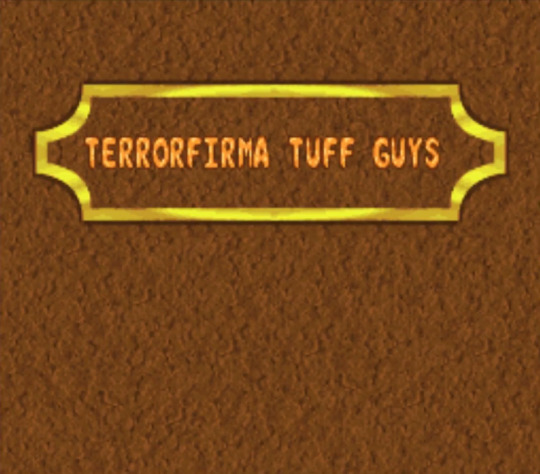
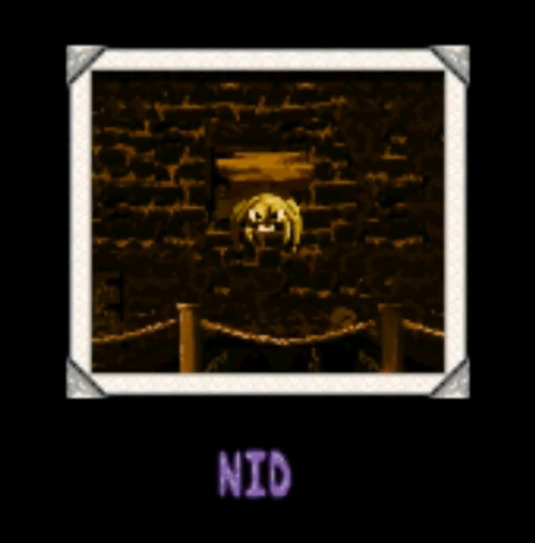
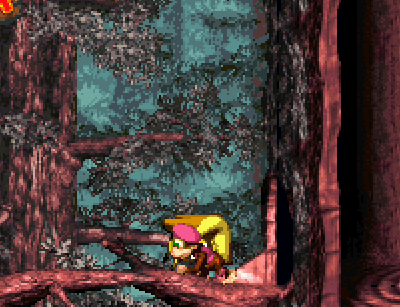
The credits for Donkey Kong Country 3 classify all of the game’s characters into categories. The spiders from the Springin’ Spiders level, called Nids, are in the “Terrorfirma Tuff Guys” section that contains all ground enemies. However, Nids are not able to harm the Kongs, and their purpose is to provide platforms for the Kongs to proceed in the level. Thus, it would be more correct to classify them as Animal Buddies, like Clapper the Seal from Donkey Kong Country 2, than as enemies.
Main Blog | Twitter | Patreon | Source: DKC3 (NA, SNES)
266 notes
·
View notes